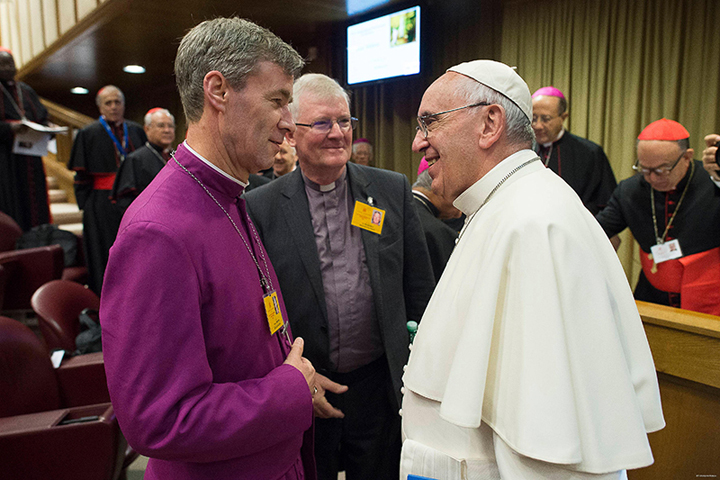
Anglican Bishop Tim Thornton visits with Pope Francis during the synod at the Vatican. Photo courtesy of L’Ossevatore Romano
Anglican Bishop Tim Thornton’s vivid purple cassock instantly marks him as an outsider at the Vatican’s Synod of Bishops on the family, a bright spot against a backdrop of deeper purple and red sashes and zucchettos worn by Catholic bishops and cardinals.
Thornton, from Cornwall, England, is one of 14 “fraternal delegates” to bring views of other churches to the synod discussions. Others include representatives from the Baptist World Alliance and the Coptic Orthodox Church.
Thornton, whose work involves fostering dialogue between Anglicans and Catholics in England and Wales, said he was struck by the approach of some Catholic bishops at the synod.
“There have been some huge surprises. I think clearly for some of the bishops, the very idea of talking together and having a discussion that might change something is still a pretty big step for them,” he said.
Following the extraordinary synod on the family a year ago, the 270 Catholic churchmen, joined by 30 or so lay observers or auditors including Thornton, have this year been divided into language-based groups; each was also given a three-minute slot to present his or her views.
Thornton said that in his three minutes, he cautioned bishops against focusing on a one-model-fits-all version of the family: “I was hearing a lot about ‘the family,’ which is some kind of ideal construct. Mine isn’t ideal, I can tell you!”
While he was cautious about preaching the Anglican approach to his Catholic hosts -- many Anglicans have a greater openness on matters such as same-sex couples -- he hinted at the need to acknowledge the changing face of families.
“As Christians, if we don’t accept change -- embrace change as a key element of who we are -- I think we are being less true to the gospel,” he said. “And if we change, who knows what’s going to happen tomorrow? We are open to what God is wanting of us.”
As some of the Catholic bishops at the synod resist proposed changes to church doctrine, Thornton said many have failed to recall that the Catholic Church has changed over the centuries: “The way the church has treated families, the way families have treated the church, has changed significantly, but that doesn’t seem to have featured much.”
Anglicans, with 85 million followers across 165 countries, have their own problems facing new challenges. Archbishop of Canterbury Justin Welby, who leads the worldwide Anglican Communion, will host a meeting of church leaders in January to discuss how to address regional divisions on issues such as women priests. In order to allow more autonomy for local bishops, the Communion may decide to loosen its structure.
At the Vatican, some Catholic bishops have raised fears that instigating change could see the Catholic Church follow the Anglican route. This could translate into a loosening of church ties around the world, or a dramatic shift in doctrine that could reshape Catholicism.
But Thornton said he was not in Rome to push his point of view: “I am not the person to sit here and say in any way that we’ve got it half right, right, or all right.”
He did, however, outline how his view, as an Anglican bishop, differs from that of his Catholic counterparts: “I don’t think I do go along with what appears here, which is that there is a thing called doctrine, a thing called pastoral practice, and somehow those two are either clearly delineated, or there is an obvious gap between them that needs to get linked up.”
Thornton said his approach is to respond to the “experience of the world,” making a judgment on modern-day problems based on Christian teaching.
But he admitted that the Anglican church has struggled to make itself attractive and accessible, with the number of churchgoers steadily falling.
“I think that must be a common issue for some of the Catholic countries, if not all of them,” he said. “I think there are radical changes that we need to bring about, because what we’ve been doing, for me, has not been working in that sense. We’ve been in decline for a very long time.”
In Rome, this year’s Catholic synod has tried to some extent to adapt itself to the modern-day family by inviting a select few laypeople to share their experiences. Because they are hand-picked by the Catholic Church, there is little chance of any revolutionary viewpoints being raised, but Thornton said their input has been positive and some have challenged church teachings on divorce and contraception.
With the three-week synod set to conclude on Sunday, Oct. 25, pressure is mounting on bishops to present the outcome of their discussions.
Although churchmen have been called upon to discuss a whole host of family matters, much of the debate has focused on whether to allow Catholics who have divorced and remarried outside the church to receive Communion.
But Thornton said the synod should be considered part of a broader conversation, not an endpoint in discussions. “I worry about the expectations for the end of this week, and I would have thought there might have been a differently managed process, that might have played down expectations as to what the final statement might do,” he said.
Citing comments made on Saturday by Pope Francis, who called for decentralization of power and greater authority for bishops, Thornton said a much lengthier process was underway at the Holy See. “I presume what’s going on here at one level is a change of culture, which will take a very long time,” he said.